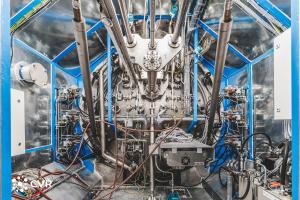A blast of heat to test Europe's plasma-facing components
At the HELCZA experimental and testing facility in the Czech Republic, the European Domestic Agency is about to begin high heat flux tests on blanket first wall prototypes.
Blanket first wall panels are the detachable, front-facing elements of the ITER blanket that are designed to withstand the heat flux from the plasma. Depending on their position inside the vacuum vessel, the panels are subject to either "normal" heat flux (2 MW/m²) or "enhanced" heat flux (4.7 MW/m²).
For the European Domestic Agency, which is responsible for procuring the "normal" heat flux first wall panels, the high heat flux validation of first wall prototypes will provide important feedback in view of the start of series production.
HELCZA (for High Energy Load Czech Assembly) is designed for this purpose, with a capacity to test ITER plasma-facing components with heat flux densities in the range of several MW/m². Located at the Research Centre Řež in Plzeň, it was financed by the European Domestic Agency (Fusion for Energy) with the support of the European Union and the Ministry of Education, Youth and Sports of the Czech Republic.
HELCZA is designed for cyclic heat loading, with an 800 kW electron beam gun emitting electrons at 55 kV acceleration voltage. The facility is also equipped with a set of advanced diagnostics to monitor component behaviour during testing, and a beryllium management system to ensure the safety of the operators before, during and after the test campaigns.
Performance tests on Europe's first wall full-scale prototypes will start in the next weeks.
See the original article on the Fusion for Energy website.
Read more about HELCZA here.


